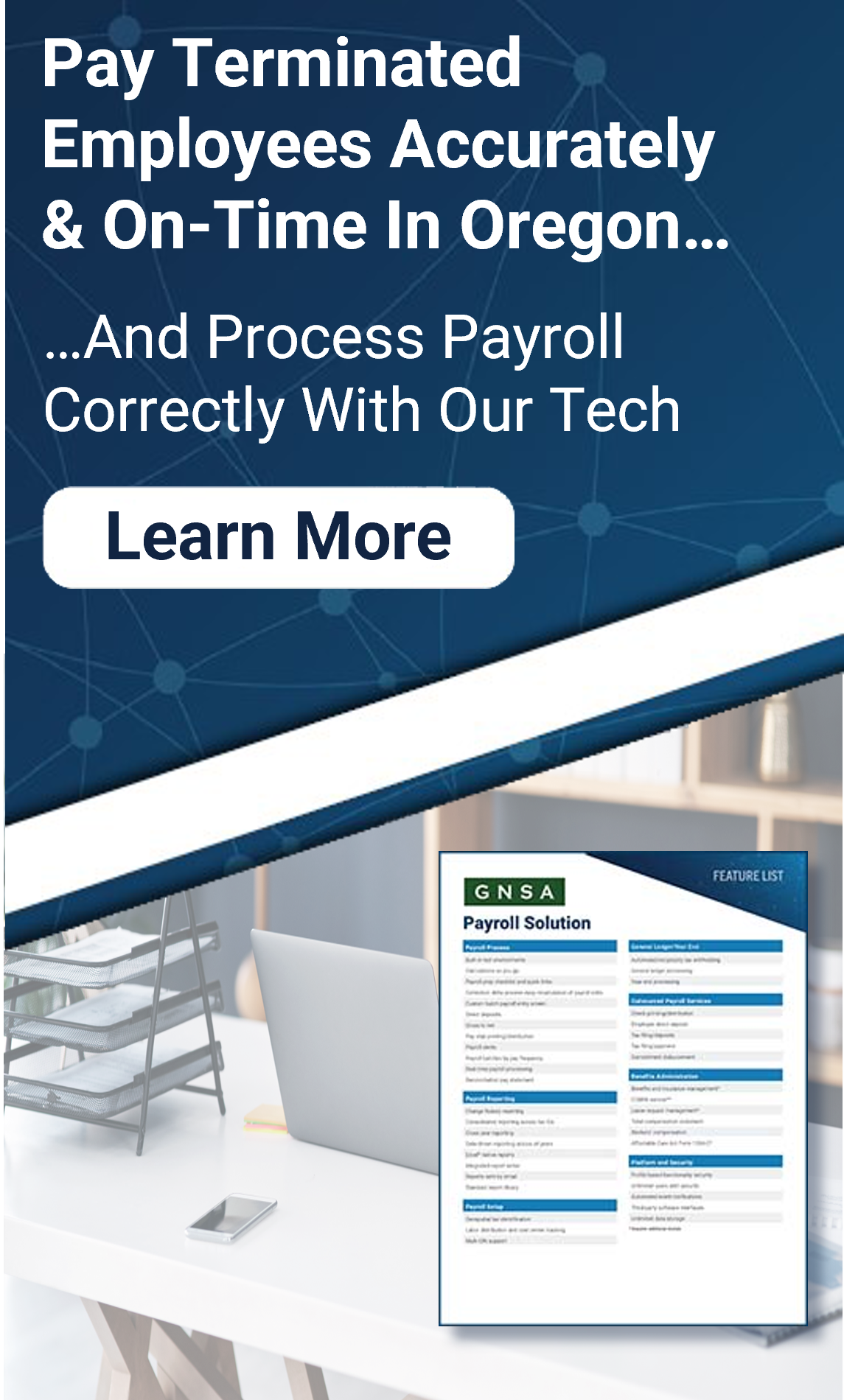When an employee departs your business, via choice or termination, you need to know what the rules are for ensuring they receive any final compensation that is due. Here is everything Oregon businesses need to know about Oregon Final Pay Laws when processing payroll.
Oregon Employee Termination Laws for Final Paychecks
When processing payroll in Oregon, employers need to ensure compliance with Oregon Labor Laws. One of the most crucial areas of Oregon compliance when it comes to payroll is final pay.
Final pay refers to final compensation due when an employee is fired, laid off, or quits. Depending on the circumstance, different rules may apply.
Businesses that don't want to stress about payroll processing and compliance with things such as Oregon Final Pay Law should consider an Oregon payroll solution to help streamline processes and keep payroll accurate.
How Long Does an Employer Have to Pay You After Termination in Oregon
There are strict requirements when it comes to payment of all wages that are still due when an employee quits, gets fired, or is laid off. Employers must ensure that final pay satisfies Oregon Minimum Wage requirements, and includes compensation for all hours worked in Oregon, including Oregon Travel Time Pay.
Oregon Final Paycheck Law for Terminated and Laid-Off Employees
When an employee is terminated in Oregon (fired) or laid off, their paycheck is due at the end of the next business day. Payment is due on the next business day regardless of whether or not termination was mutual.
Oregon Final Paycheck Law for Employees Who Quit
When an employee quits in Oregon, how soon they receive final pay depends on the notice they gave the employer, prior to quitting.
If an employee quits with less than 48 hours notice, then the final paycheck is due within 5 business days, or the next regularly scheduled payday, whichever comes first.
If an employee quits with at least 48 hours notice, then the final paycheck is due on the last day of employment. If the last day of employment is a weekend or a holiday, then the paycheck is due on the next business day.
Important to also note, is that weekends and holidays do not count toward the 48 hours' notice.
Special Rules for State and County Fairs
For employees whose employment is related to a state or county fair, if their employment terminates on a weekend or holiday then their final paycheck is due by the end of the second business day after termination, rather than the first.
Special Rules for Seasonal Farmworkers
Employers of farmworkers need to be careful when terminating employees, as final pay is due immediately. If the termination occurs at the end of the harvest season, however, final pay is due by noon on the day after the termination, as long as certain other conditions are met.
For farmworkers that quit without 48 hours' notice, final payment is due within 48 hours or the next scheduled payday, whichever comes first.
Special Rules for Commission-Paid Employees
If an employee is discharged but has not yet been paid all due sales income, then final payment is due by the end of the next business day.
If there is a commission agreement that states that commissions on sales are not "earned" by the employee until payment is received by the company, then all non-commission earnings must be paid to the terminated employee.
However, the employer may exclude commissions on sales that have not yet been earned. These may be paid later when the amounts due are known.
Late Paycheck Penalty in Oregon
Businesses that fail to adhere to Oregon Final Pay Law risk penalties for non-compliance.
If a business fails to give an employee final payment on time, they may be subject to a penalty wage of eight times the employee's regular wage rate for each day that final wages go unpaid for up to 30 days.
Oregon Final Pay Law also provides a $1,000 civil penalty for willful failure to pay wages at termination as well as costs, interest, and attorney fees.
You never want to see a late paycheck penalty, so if you are struggling with processing payroll on-time, now may be the best time to switch payroll providers.
Oregon Termination Laws and Payroll Processing Services
If things like Oregon's final pay are slowing down your business, it may be time to consider a modern payroll solution that helps streamline payroll and things such as final paychecks. Oregon employers, in addition to final pay laws, should also ensure an understanding of Oregon At-Will employment before terminating any employees.
Employers should also ensure that any necessary actions are taken regarding employee benefits upon termination. For instance, all employers in Oregon must offer retirement plans or OregonSaves, and must distribute assets from a terminated retirement plan as soon as administratively feasible.
To learn more about how GNSA is helping countless businesses with processing payroll, contact us today.


.png)


